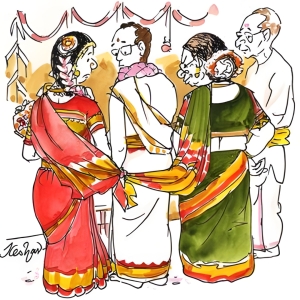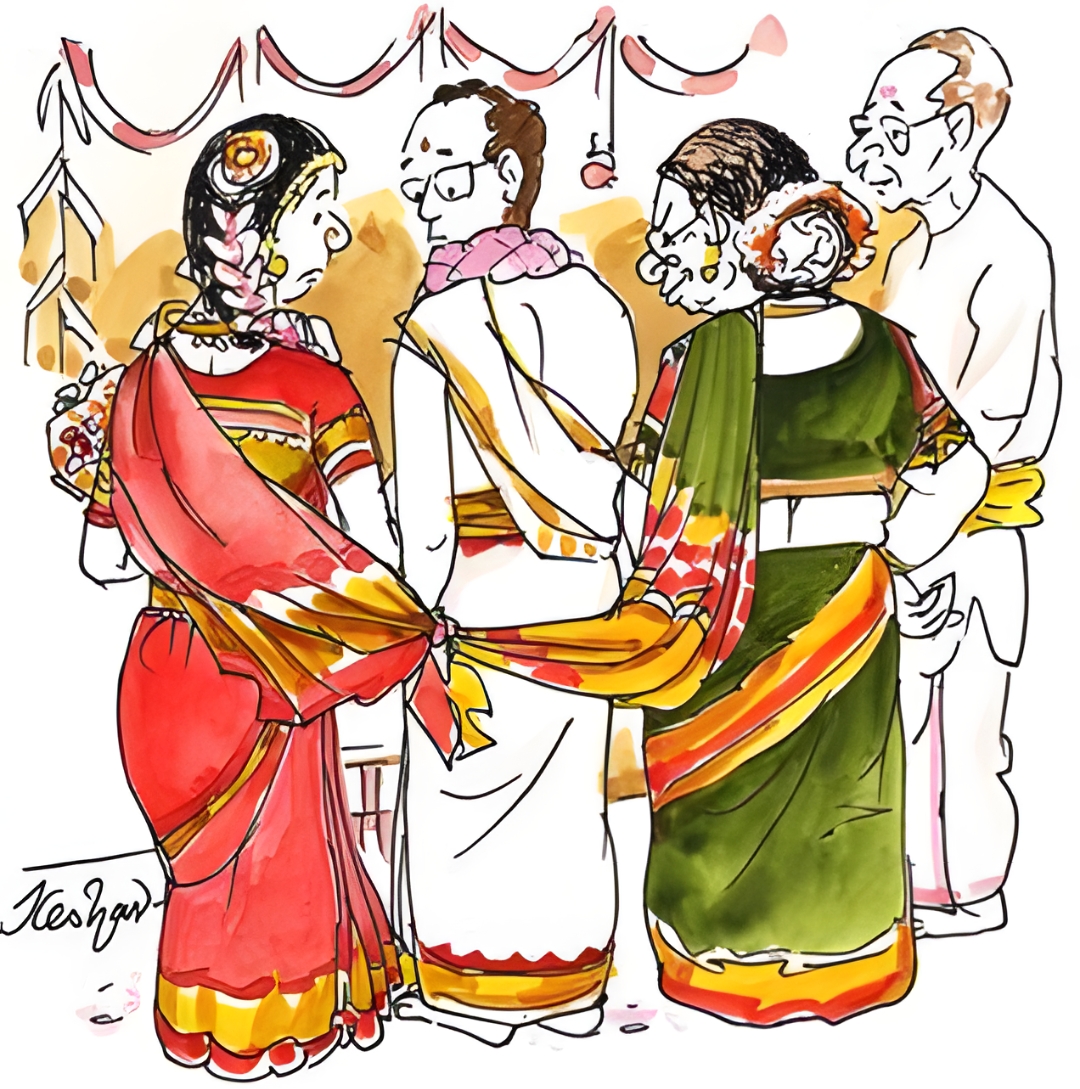
.jpg) Dr P. Raja
Dr P. Raja

"Name an insignificant piece of straw as mother-in-law and see how it frolics and frisks," so goes an old Tamil adage. It thoughtfully conveys the power a mother-in-law enjoys in the presence of her daughter-in-law. Her overpoweringness reaches indubitable heights when the poor daughter-in-law remains tongueless and unassertive. Don't folks say, "A frightened dog becomes an easy prey to a chasing dog"? This in-law friction leads to mental and emotional struggles that last for years. We have personally observed the behaviour of mothers-in-law and been acquainted with it through world literature. Some function as goddesses, and many conduct themselves as devils. Yet both remain in the garb of human beings.
The custom of getting married and moving in to live with the parents-in-law has caused problems in many families, and many young wives have suffered because of their mother-in-law's often meddlesome and authoritarian attitude. Disagreement may rise over things as insignificant as how to hang shirts on the clothesline. Invasion of privacy can become extreme. The poor young woman becomes tired of being ordered around. Although she keeps calm on the surface, she lives in anguish. There is very little she can do except grin and bear it.
In the remote villages of Tamil Nadu, the women still walk two or three kilometres to a lake or a river to fetch water. In every house, the married young girls take the trouble of going and transporting water in at least three earthen pots, holding one on their hip and balancing two on their heads. According to an old story, the election was fast approaching. The M.L.A., who contested and won the previous election, announced in a public meeting that he plans to provide water taps in every street corner of the village if not every house. The village's daughters-in-law protested, saying, "We do not want water taps. We love to walk the distance to the river, for that is the only time we are away from our mother-in-law." Some social workers investigated the matter and reported: "The daughters-in-law love gossip. Menfolk go away to their work. For how many hours will the girls suffer in the hands of their mothers-in-law?" That is the truth of the matter.
Then a question arises: "Why do daughters-in-law hate their mothers-in-law, and why do mothers-in-law have an aversion to their daughters-in-law?" A trillion-dollar question indeed. Society can attribute hundreds of reasons…each one to their word. The answer is quite simple. What both parties lack is 'Love'. Psychologically speaking, the mother feels that her daughter-in-law has snatched her son away from him. If the mother-in-law loves her daughter-in-law as she would love her own daughter, and if the daughter-in-law loves her mother-in-law as she would her own mother, the tiff between the two would not show its head. All problems between the two can be easily solved provided both sit and discuss, though each member will likely have a different yardstick.
As we know, a bush cannot hold two robins simultaneously. Since the two – mother-in-law and daughter-in-law – play the role of heroines in the same family, there is an inherent tendency to abhor each other. Problems start when two women share a kitchen. Such issues arise mainly in a joint family and rarely in a nuclear family. In the latter, the mother-in-law is a nonentity, sometimes an uninvited guest and most of the time, she finds her place in an easy chair, dreaming of the days when she was the unquestioned kitchen queen. The daughter-in-law, too, cares not a damn for her mother-in-law and drives her out of the kitchen by using honey-coated words like "Take rest. At this age, you need a lot of rest. You have to travel back within a couple of days. There you will have to work in your kitchen. Don't you ever worry, ma. Take ample rest."
The subtle ways the daughter-in-law uses her words in such circumstances is everybody's guess. The visiting mother-in-law, too, discovers, to her great dismay, that she holds no sway over her host. She remains an unwanted guest for a day or two and unhappily prepares for her travel back home. The bushes, too, are happy with the two robins in two different places.
The case is quite different with the mother-in-law and daughter-in-law when they spend their lives under one roof. The very sight of the mother-in-law angers the daughter-in-law. And the very sight of the young woman infuriates the old lady. This is because of the principle of 'hatred at first sight'. This is because of the prejudice they have developed and nurtured. This is because of the folktales and cock and bull stories they have heard from various sources and believed to be accurate to the core. The age-old conflict between mother-in-law and daughter-in-law is considered authentic and universal.
To the daughter-in-law, her mother-in-law easily passes for a hornless devil in human form. She is fiendish, hellish, abominable, villainous, perverted and hence an annoying savage. To the mother-in-law, her daughter-in-law is a merciless, mischievous, heartless, troublesome, and annoying imp. Pity the poor man who has to play dual roles inside the house. The one-time son has become a husband now. But he is a son and husband, always ready to stomach and digest all he is destined for. The thought of being robbed of her son's affection is subconsciously deeply rooted in the mother. The result is a strained relationship. He becomes a double-sided drum that receives the pounding and pummeling but is ordained to be voiceless. A competitive spirit may quickly develop with mother and daughter-in-law vying for the affection of the same man.
Look at the plight of the embarrassed man –son and husband—designed to play the double role, but very carefully and diligently, like a tightrope walker. One slip would mean destruction.
Early one day, just at daybreak, the wife of a young man woke up with a start. She shook her husband awake and told him in a hurried voice, "Go, dear! Go and find out if your mother is alright, for I dreamt that she had died of heart attack." The poor husband hurried towards his mother's room, praying silently that his wife's dream would not come true. He jumps for joy when he sees his mother hale and hearty. No sooner did she see her son than she beamed with a smile and asked him expeditiously, "How is your wife? Is she alright? Last night I dreamt that she hanged herself."
This folktale tells us that the mother and daughter-in-law have battle axes drawn but outwardly show they have no axe to grind. To add to the folktale, here is a Prakrit love poem wherein the mother-in-law and the daughter-in-law taunt each other:
"O daughter-in-law!
I see a long bamboo leaf,
Sticking to your hair."
"If that's so, mother-in-law
There is dirt on your back."
Doubts are prevalent in family relationships, and ridiculing each other is the easiest way to express them. The conflict between mother and daughter-in-law is proverbial. Almost every mother-in-law thinks she can command her daughter-in-law, come what may. The daughter-in-law pretends to obey her, but in the heart of hearts, she murmurs, "You may command. But who will obey?"
Once, a 'magnanimous' mother-in-law gave her daughter-in-law a half-a-measure of rice and told her softly, "My dear! Cook this and serve the dozen family members their midday meals; feed the two dogs and the three cats in the backyard. Kindly see to it that something is left out to our poor neighbours also."
In another folktale, a beggar standing before a house cries for alms. In the absence of her mother-in-law, who has just gone to a nearby temple, the daughter-in-law thinks she is all in the house, and so comes to the entrance only to drive out the beggar by saying, "You sturdy fellow! Can't you earn your food? You lazy fellow! Go away, go." Ashamed, the hungry beggar moves away, cursing the young woman. He is stopped by the mother-in-law returning from the temple. She wishes to know the matter.
The beggar repeats the incident to her. "Oh, God! Did she say so? What right has she to say so? Come with me to my house and let me…," said the mother-in-law, dragging the poor fellow home.
Once inside the house, the mother-in-law looks daggers at her daughter-in-law and reproaches her for insulting the beggar for which she has no rights. The beggar, overhearing the old lady's tantrums, rejoices that he thinks she plans to give him good food and money as recompense for the ill-treatment he has received from the daughter-in-law. "You have no right to say so dear. In my absence, you should only advise such people to wait for the mother-in-law's words, which would be final. Remember to tell them that my word is law." The beggar jumps for joy when he hears the voice of the all-powerful old lady. He expects a fortune to fall into his hands. "Why are you standing here, sturdy fellow!" howls the mother-in-law at the eager beggar. "There is nothing like earning one's food. Aren't you ashamed of begging? Go away. Go." The beggar experiences the shock of his life.
Imagine the daughter-in-law's predicament. What can be expected of her? Only animosity, aversion, and antagonism will rule the roost. When the mother-in-law wants to be everything in the house and likes to keep the destitute daughter-in-law under her thumb, we cannot expect harmony to prevail in that house. The daughter-in-law, too, is an individual and would like to be freed from all sorts of cages. The thought of her freedom being curtailed by the all-powerful mother-in-law keeps the daughter-in-law down and out. The mother-in-law is the one who gives life to the old adage: "If the mother-in-law breaks a pot, she believes, it is made of mud. If her daughter-in-law happens to break a pot, she asserts that it is made of gold". In the end, it is just two wives competing with each other for control.
Dr P. Raja is an eminent writer both in English and his native Tamil. Retired as HoD for English at Kanchi Mamunivar Centre, he is currently active as a newly constituted Advisory Committee for Centre for Translation, Sahitya Akademi, Bangalore member. He can be reached at rajbusybee@gmail.com.